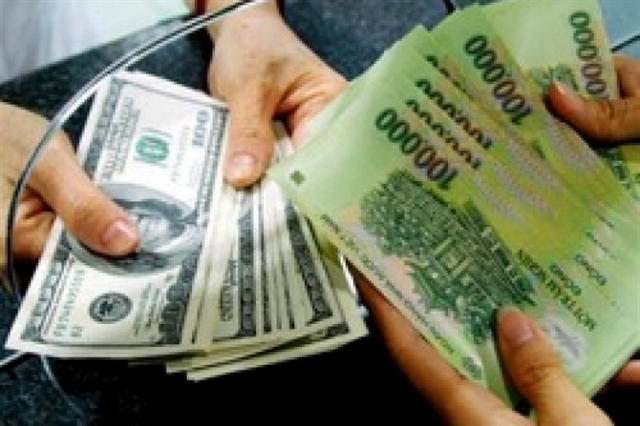 Economy
Economy


|
| The đồng is expected to stabilise around the current level. Photo cafef |
HÀ NỘI — Though the unofficial value of the Vietnamese đồng has now fallen about 3 per cent against the US dollar, the rate is still a smaller depreciation than that seen by most of Việt Nam’s regional peers and is expected to stabilise around that level, management fund Vinacapital reported.
The Indonesian rupiah, Thai baht and Malaysian ringgit slid 19, 11 and 9 per cent, respectively. Though the Philippine peso inched down 1 per cent, its relative stability is attributable to the after-effects of a 34 per cent depreciation in the Philippine peso over the five years up to late-2018.
According to Vinacapital analysts, foreign investors aggressively sold Vietnamese stocks last week, prompting concerns among some locals that the State Bank of Việt Nam (SBV) may restrict the flow of US dollars out of the country, which was one of the factors that prompted last week’s đồng depreciation. However, the SBV is not contemplating any restrictions on foreign investors from repatriating dollars, and that the SBV has more than enough reserves to comfortably meet redemption.
“Việt Nam’s US$83 billion of foreign currency reserves are much larger than the country’s cumulative $30 billion of foreign indirect investment (FII) in-flows, and a high proportion of those FII are inflows were into illiquid private equity and/or large strategic stakes in publicly listed companies – both of which cannot be sold quickly. In short, the SBV has more than enough reserves to meet any short-term panic redemptions by foreign investors,” the analysts explained.
It noted that foreign investors sold around $260 million worth of stocks last week, but unlike past global “risk-off” episodes when investors sold Vietnamese stocks but kept the funds in the country such as at the end of 2018, this time some investors are repatriating dollars back to their home countries in response to the current global shortage.
Furthermore, since Việt Nam has not been a major recipient of the “hot money” inflows that destabilised ASEAN tiger economies in the past (for example, the proportion of Vietnamese Government bonds owned by foreign investors is very low, unlike in Indonesia), the SBV is well-positioned to meet any potential short-term panic redemptions by foreign investors.
Vinacapital believed the USD-VNĐ exchange rate should stabilise around the current level as the US Federal Reserve took concrete actions to stop the surge in the USD/DXY index last week while the SBV does not need to impose capital controls and the đồng is supported by high bank deposit interest rates and 33 per cent per GDP of forex reserves.
Việt Nam’s total reserves now reach up to about $83 billion, or four months’ worth of imports, but this figure understates the degree of support that Việt Nam’s FX reserves afford the currency because Việt Nam’s imports and exports are both around 100 per cent of GDP, which depresses the above-mentioned four months’ figure.
“For that reason, we’d like to highlight that Việt Nam’s current 32 per cent per GDP worth of FX reserves has nearly reached the 33 per cent per GDP level of FX reserves that China had accumulated just before the Yuan embarked on a 7-year appreciation that ultimately lifted its value by about 25 per cent,” Vinacapital noted
The country’s trade surplus reached nearly $3 billion as of mid-March, including a surplus of nearly $900 million in the first two weeks of this month, driven by 7 per cent year-on-year export growth.
Besides, Việt Nam’s deposit rates are attractive compared to regional peers and are becoming relatively even more attractive as regional peers’ central banks slash policy interest rates, the analysts said. — VNS




